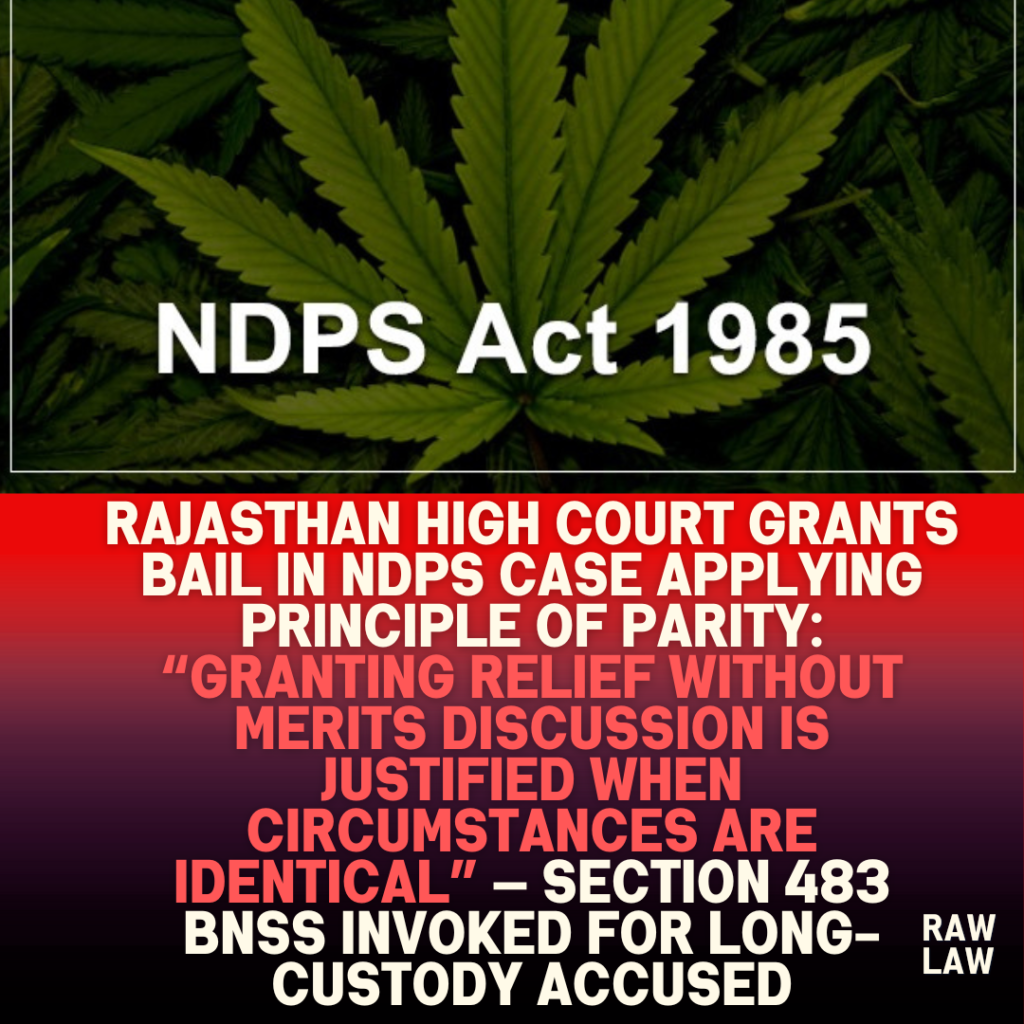Court’s Decision
The Rajasthan High Court granted bail to the petitioners in a criminal case registered under Sections 8/22 and 25 of the Narcotic Drugs and Psychotropic Substances Act, 1985, holding that given the prevailing circumstances, it was appropriate to release them without delving into the merits of the case. The Court noted that the co-accused had already been granted bail and found no compelling reason to continue the petitioners’ incarceration. Bail was granted under Section 483 of the Bharatiya Nagarik Suraksha Sanhita, 2023, subject to conditions including furnishing a personal bond of ₹1,00,000 each and two sureties of ₹50,000 each to the satisfaction of the trial court.
Facts
The petitioners were arrested in connection with a case registered at Police Station Nokha, District Bikaner, involving alleged possession and offences under the NDPS Act. They had been in judicial custody for a considerable period. It was submitted that one of the co-accused, Iwtka Rameshwari, had been granted bail by the same court earlier on 26 June 2025, and another co-accused, Jivo Ram, was granted bail on 29 July 2025. Relying on this parity, the petitioners argued that their continued detention served no purpose. They filed bail applications under Section 483 of BNSS seeking their release.
Issues
Whether, considering the grant of bail to similarly placed co-accused and the time already spent in custody, the petitioners were entitled to bail under Section 483 of the Bharatiya Nagarik Suraksha Sanhita, 2023, without a detailed discussion on merits.
Petitioner’s Arguments
The petitioners argued that they were falsely implicated in the case and that their custody had already extended for a significant duration. They stressed parity with co-accused who had been granted bail by the High Court on earlier dates. They contended that there were no distinguishing factors in their case that would justify continued incarceration. They urged the Court to adopt a consistent approach and grant them the same relief as given to the co-accused, especially when the trial was likely to take considerable time.
Respondent’s Arguments
The Public Prosecutor opposed the bail plea, asserting that given the nature of the offences under the NDPS Act, the allegations were serious. It was argued that the petitioners’ release could hamper the trial and the investigation process. The prosecution sought rejection of the bail applications, submitting that the gravity of the allegations warranted continued detention.
Analysis of the Law
Section 483 of the Bharatiya Nagarik Suraksha Sanhita, 2023, deals with the High Court and Sessions Court’s power to grant bail. While the NDPS Act imposes stringent conditions for bail, the Court emphasised the principle of parity and proportionality of detention, noting that once co-accused have been granted bail under similar circumstances, denial to others without clear grounds would be unjust. The Court refrained from a detailed merits analysis to prevent prejudicing the trial but considered the factors under BNSS regarding judicial discretion in bail matters.
Precedent Analysis
The Court implicitly followed the parity principle established in prior rulings, including:
- Kalyan Chandra Sarkar v. Rajesh Ranjan — where the Supreme Court held that parity is a relevant consideration in bail decisions.
- Dataram Singh v. State of Uttar Pradesh — reiterating that bail is the rule and jail the exception, subject to conditions ensuring trial participation.
These precedents reinforced that once a co-accused is granted bail in similar factual circumstances, others similarly placed should receive equal treatment unless distinguishing factors exist.
Court’s Reasoning
Justice Chandra Shekhar Sharma noted that both the petitioners had been in custody for a considerable time and that co-accused in the same FIR had already been granted bail by coordinate benches of the High Court. The Court found it fit to extend the same relief without examining the merits to avoid prejudicing the trial. The judge emphasised that circumstances indicated no reason to keep the petitioners in further custody and that bail could be granted subject to conditions ensuring their presence during trial.
Conclusion
The bail applications were allowed under Section 483 BNSS. The Court directed that the petitioners be released on bail upon furnishing a personal bond of ₹1,00,000 each and two sureties of ₹50,000 each to the satisfaction of the trial court. It was mandated that they attend all trial proceedings and comply with bond conditions, failing which bail would stand cancelled.
Implications
The ruling reinforces the principle of parity in bail jurisprudence, particularly under stringent statutes like the NDPS Act, and affirms that prolonged custody without trial progress can justify bail even in serious offences. It underscores the High Court’s discretion under BNSS to balance the rights of the accused with the interests of justice.
FAQs
Q1: What is the significance of granting bail on the basis of parity?
Parity ensures that similarly placed accused in the same case are treated equally unless there are distinguishing factors, promoting fairness and consistency in judicial decisions.
Q2: Does the NDPS Act bar bail in all cases?
No. While the NDPS Act imposes strict conditions for bail, courts can grant bail if conditions under Section 37 are met or if other legal considerations like parity and delay justify it.
Q3: What conditions did the Court impose for bail in this case?
The petitioners must furnish a ₹1,00,000 personal bond and two sureties of ₹50,000 each, attend all trial hearings, and comply with bond terms, failing which bail will be cancelled.



